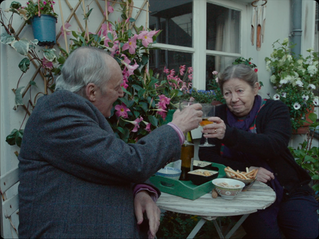The King of Comedy
- Lauren Mattice
- Nov 6, 2021
- 3 min read
Martin Scorsese, 1983

In a collaboration that many have deemed the best of its kind, director Martin Scorsese and leading man Robert De Niro created a terror-inducing, skin-crawling, presciently funny marvel in The King of Comedy (1983).
The King of Comedy was a lot of things in its infancy. It was a script developed by Newsweek journalist Paul D. Zimmerman in the 1970s, inspired by a real story in Esquire about an obsessed fan of long-time talk show host Johnny Carson. The man kept a detailed diary documenting his thoughts on each of Carson’s shows, with one such entry reading: “Johnny disappointed me tonight.”
“The talk shows were the biggest shows on television at the time,” Zimmerman remembered. “I started to think about connections between autograph-hunters and assassins. Both stalked the famous—one with a pen and one with a gun.”
The transition from pen to gun is the main tension in The King of Comedy, where local nobody Rupert Pupkin (De Niro) is determined to convince esteemed talk show host Jerry Langford (Jerry Lewis) that he deserves a spot on his program.
De Niro wasn’t originally attached to the project, and Lewis was also not the ideal casting for the host. Zimmerman initially worked with One Flew Over the Cuckoo’s Nest director Milos Forman on first drafts, who ultimately dropped out after a few years. De Niro came across it and brought it to Scorsese in 1974, who turned it down for not “quite get[ting] it.” After another of their collaborations, Raging Bull, came and went, De Niro brought the script back, and Scorsese, now older, wiser, and a bit more famous, started to understand its relevance.
We get to know Rupert through the elaborate creations of his psyche. He initially makes contact with Jerry (who Johnny Carson did not want to play) among a crowd of fans as he tries to distinguish himself as a peer rather than a groupie. Scenes of Jerry growing increasingly uncomfortable with Rupert’s insistence to get on the show are spliced with staged sets in Rupert’s mom’s basement — imagined rehearsals of his set with Jerry and other celebrity cardboard cutouts. Scorsese’s longtime editor Thelma Schoonmaker makes the transition from reality to fantasy seamless and purposeful.
The ease with which De Niro plays this maniac is what makes each scene as uncomfortable as it can be. His suaveness manages to convince high school sweetheart Rita Keane (Diahnne Abbott) that his relationship with Jerry is real enough to the point that a weekend at his country home seems plausible; a mounting step in an increasingly hostile identity takeover.
Fellow groupie and East Side rich girl Masha (Sandra Bernhard) is the sounding board to which Rupert tries to convince himself of his “normalness.” Whereas it seems Rupert has a purpose in his madness, Masha is more erratic, stalking Jerry because of a misplaced love and longing to share her otherwise lonely life with him. Her compulsivity and jealousy of Rupert’s “closeness” makes her the ideal partner for a last-chance gambit at fame: a kidnapping by The King himself.
The horrific possibility of Rupert’s actions is revealed subtly, such as a comment within the hostage situation that he knows the sounds when a phone call is being traced, his rancorous laugh with his inanimate talk show guests, and his ease with a gun. In exchange for Jerry’s life, he asks TV execs for one shot on the show, one chance to prove it all.
While Jerry is taped down to a chair, Masha singing him the sweet nothings of Ray Charles’ “Come Rain or Come Shine,” much of which was improvised, Rupert makes his way to the studio for his big debut. Unfazed by the FBI, head of police, and security notifying him of his imminent arrest, he responds, “I need to be made up.”
All of this build-up, leading us to believe the worst is yet to happen, comes to a head with the debut of Rupert’s set. His obliviousness, awkwardness, and lack of nerve lend themselves to knockout comedy. The audience stays with him all the way, through his admittance to the kidnapping plot, getting himself and newfound supporters to believe: “Better to be king for a night than a schmuck for a lifetime.”
The film forces Rupert’s lack of regard for boundaries or morality down our throats; it is both a satire and a warning of what the allure of fame and success can conjure. Rupert’s stunt made him even more famous than Jerry, earning him a book deal, movie adaptation, and agent along with six years in prison. What was a flop in the box office is an evermore heedance to the suspension of lines separating private and public life, gradually making its way to the title of comedic masterpiece.








Comments